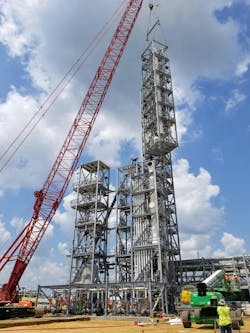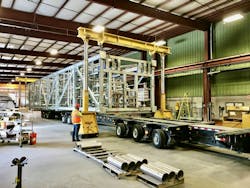Truckable modules driving innovation – understanding the benefits

In the past decade, the chemical processing industry has seen remarkable advancements, particularly in commercializing technologies due to the increased use of modular construction. Disruptive technologies have propelled the industry forward, and modularization has played an essential role in ensuring projects meet financial investment hurdles.
Construction costs are steadily increasing, compounded by labor shortages and high interest rates for project financing. As a result, companies of all sizes and investors are seeking alternative methods to reduce project delivery risks, achieve significant cost savings and expedite timelines for quicker market entry. Modular construction has emerged as a key area where disruptive technologies are being leveraged to create a project delivery model that minimizes costs, reduces labor needs and worker density, and mitigates overall risks.
Modular construction
Modules have two key characteristics that set them apart from traditional field-erected construction: modular design and off-site construction.
While pre-assembled units (PAUs) — such as pipe racks and pump skids — share similarities with modular construction in that they can be built offsite, they are typically basic and limited in function. For example, a PAU might consist of a simple pump skid but cannot support an entire process system.
In contrast, modular construction involves fully integrated, scalable and repeatable systems that encompass all necessary process equipment. This makes them far more comprehensive than standard PAUs. Moreover, unlike PAUs, which often lack seamless integration into greenfield or brownfield facilities, modules are specifically engineered for efficient integration into both types of projects.
One key advantage of modular construction over traditional field-erected methods is that modules can be fabricated indoors at off-site facilities, ensuring a controlled environment and consistent labor conditions. Selecting an optimal location for construction activities offers several benefits, including reduced site congestion, improved labor availability, enhanced productivity and overall safety and quality performance.
Three main types of modules are commonly used in the industry: Conventional, Mega and Truckable. The type of module selected depends on each project's unique design and delivery needs. While Conventional modules were once the industry standard, Mega and Truckable modules have become increasingly popular. Truckable modules, in particular, have seen significant growth in recent years thanks to their flexibility, complexity and potential for cost savings. Below, we will take a closer look at the benefits of truckable modules.
Flexible and scalable solutions
Truckable modules are compact, transportable units, typically measuring 12 by 14 feet and up to 80 feet long and weighing up to 100 tons. They are ideal for small to mid-sized projects, especially when water access is limited. These modules are well-suited for applications involving columns under 7 feet in diameter and tanks or reactors under 10 feet.
Their flexible design allows for slight size adjustments to accommodate road conditions, and they can be transported by truck, rail, water or air. Truckable modules can consolidate process systems for smaller projects or be split for larger, more complex ones. They can be installed horizontally, vertically or stacked, though larger projects may require alternative solutions such as hybrid or conventional modules.
Precision and complex engineering
Truckable modules can handle a high level of complexity, making them an ideal solution for advanced applications in the chemical processing sector. Integrating sophisticated engineering and intricate systems is key in modular construction, primarily for chemical plants. These modules are designed to house complex piping networks, specialized reactors, advanced instrumentation and state-of-the-art control panels — each component meticulously engineered and assembled to work in harmony.
The horizontal configuration of truckable modules enables multiple systems to be efficiently transported by road and precisely assembled into a single vertical unit at the installation site.
Off-site fabrication ensures strict quality control standards are met, reducing the risk of errors compared to on-site assembly. Complex equipment such as pressure vessels, heat exchangers and pumps can be pre-installed in a controlled environment. At the same time, automation and control systems can be tested utilizing portable control rooms to simulate real-world operations, thus ensuring proper function once installed in the field. This approach boosts reliability, shortens installation time and streamlines commissioning for chemical processing operations.
Cost savings
Modular construction may involve a marginal increase in upfront engineering and a slight uptick in structural steel costs, but the savings from reduced labor hours far outweigh these, thanks to the efficiency of horizontal modular construction. Additionally, indirect cost savings — such as fewer field construction hours, less disruption to existing operations and a faster delivery schedule — further contribute to the overall cost reduction. Truckable modules can result in cost savings of 20% to 30% compared to traditional stick-built methods.
Conclusion
Truckable modules mark a significant leap forward in modular construction, delivering practical solutions and innovative designs tailored to the chemical processing industry. All projects should evaluate early during the feasibility phase how they can best leverage the benefits of modularization, and more specifically, how truckable modules can enable owners to maximize these benefits.
About the Author
Tom Schafer
Tom Schafer is a chemical engineer with 48 years of experience in process design, operations management, cost estimating, plant layout, and sales and marketing. His specific expertise in equipment design includes distillation, heat transfer, fluid flow, and process control. Schafer earned BS and MS degrees in chemical engineering from Manhattan College.
